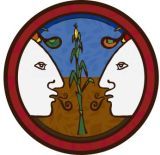Tom Kemple is a sociology professor at the University of British Columbia and a long-time friend of Pop Wuj. With his colleague Sylvia Berryman in Philosophy, he has been bringing groups of students to study in Guatemala since the summer of 2010. In November and December, 2016 he spent five weeks studying Spanish, building stoves, helping out in the clinic and Nutrition Program, and having fun at the Family Support Center. What follows are some of his fieldnotes from his trip for his research project on university fieldschools and study abroad programs, titled “Global Citizenship at Home and Abroad.” We hope you enjoy Tom's stories and insights as much as we enjoyed having him back at Pop Wuj.
One of my aims in returning to Pop Wuj has been to learn more about the school’s largest and most complex program — Medical Spanish combined with the Clinic downstairs. So I’ve started attending the ‘Competencia Cultural’ lectures given by Roney Alvarado, one of the founders of the school in 1992 and a professor of Anthropology at nearby San Carlos University.
Many of the students who have come here with me in the past remember Roney as the brilliant ‘organic intellectual’ who challenged us through three long sweaty sessions to ask a simple question: "Why am I here?” As students often say in pre-program interviews, they’re here for the courses and the credit, with some adventure and new experiences thrown in as an added bonus. Like the three medical students sitting with me the other day, my passage here has mostly been paid out of someone else’s pocket – my university’s Arts Research Abroad fund or a Research Stipend. For Roney, the question “why am I here?” cannot be reduced to the commercial service provided by the school, and so he invites us to think about the meaning and value of volunteer work. As he explained in our first session, the Pop Wuj philosophy turns the practice of other language schools on its head: rather than take a percentage of tuition fees and invest them into development projects undertaken by other organizations, Pop Wuj coordinates its own social and medical projects by offering services for fees (Spanish classes) that finance those projects. For that reason, it’s often impossible to fix an exact monetary relationship between tuition paid and projects delivered, as one would in a financial report.
The money we pay for classes and the muscle we put into volunteering are not simply economic resources but also ethical expressions of our social solidarity with the people and projects that are the heart and soul of this organization.
Although this is my fourth time attending Roney's lectures, he always seems to find new ways of connecting my personal experiences with larger questions about capitalism and colonialism. Listening to him shatters my assumptions about the place of intellectuals in the world, and undermines many of the liberal-philanthropic impulses that I bring with me here.
 |
Roney Alvarado discusses the Safe Stove and Reforestation projects with families from Llanos del Pinal |
When I asked him to say a bit more, he elaborated on the meaning of ‘Ladino,’ the racial group that he himself identifies with and that is often the target of stereotypes. Roney pointed out that the term in colonial times referred to baptized or Hispaniciazed Indians, although later came to have class connotations that included poor non-indigenous peasants and urban workers. As I’ve been reading in other books, Ladino in Guatemala is different from what in Mexico or Nicaragua is referred to as Mestizo, which is understood more as a self-consciously ‘mixed’ (European and indigenous) identity. As Roney stressed, the process of so-called ‘ladinoized’ identity-formation cuts in many directions, and cannot refer only to the ‘Europeanization’ of rising economic classes or political elites, since it is also evident in many other alliances of solidarity between social groups, and in movements toward ‘indigenization’ as well.
I have noted some of these cross-currents here at the school, beginning with its Mayan name, and in the commitment of both ‘Ladino’ and self-identified ‘indigenous’ teachers to work with poor indigenous communities. I also found Roney’s remarks helpful in understanding the coffee finca near Reu which our group has visited on previous trips, where the poverty so evident among Ladino peasants is in many ways similar to the conditions of indigenous communities such as Llano del Pinal.
In that morning’s lecture Roney placed a lot of emphasis on commonplace stereotypes of the culturally incompetent ‘do-gooding gringo,’ often with a touch of anger and cynicism, but always with good humour and penetrating insight. He pointed out that the families who come to the clinic or who benefit from the social projects often hold many of these same stereotypes, as do some of the Guatemalan doctors, and for that reason he holds cultural competency discussions with them as well (see the photo above of the Safe Stove group meeting).






















